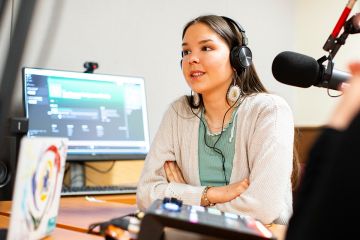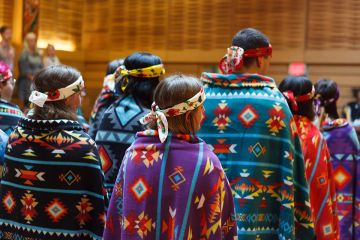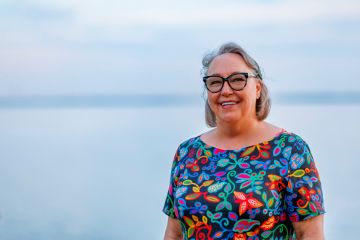Oceans as sources of law
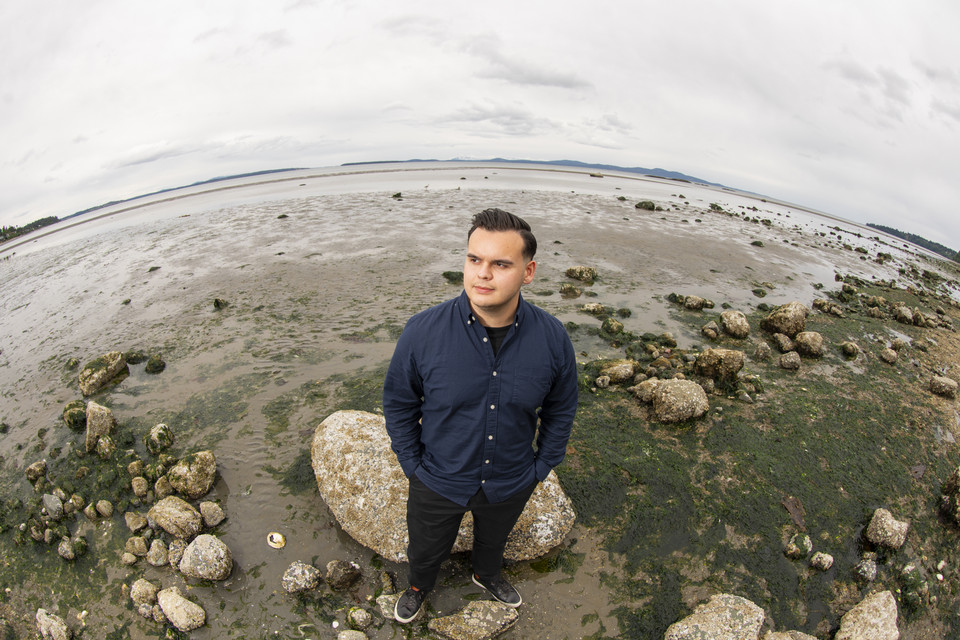
The future of water governance in Canada relies on coastal Indigenous legal orders
As his paddle dipped into the waters that connect coastal Indigenous nations across the globe, Andrew Ambers mused how differently the land looked from the water—and what Canadian laws could look like if they were crafted with the same viewpoint.
Ambers is Kwakwaka'wakw from ‘Namgis and Ma’amtagila, whose territories are on Northern Vancouver Island. It was the summer of 2023, and he participated in a canoe journey to various coastal Indigenous nations in Canada and the United States that graciously hosted them. As much as he was focused on the water around him, as an Indigenous law student at the University of Victoria (UVic), Ambers found himself reflecting a great deal on the laws governing the waters around him. This interest has guided Ambers’ participation in various Indigenous-led projects, and his research on Indigenous water rights and Indigenous international law as a graduate fellow at Borders in Globalization at UVic.
“Many coastal Indigenous communities are marine-oriented through travel, trade, food systems, and relationships. Oceans are part of the territories of coastal nations and make up important portions of their rights” he says. Despite this, “Indigenous ocean occupation and Aboriginal aquatic title are yet to be recognized and affirmed in Canada.”
In the second-ever declaration of Aboriginal title by Canadian courts in The Nuchatlaht versus British Columbia, Ambers considers how “the court recognized the unique marine circumstances of coastal nations but did not move beyond the land-locked nature of Aboriginal title.” This has inspired Ambers to undertake the work of advancing strategies to ensure that waters are not excluded from Indigenous rights in the future.
Indigenous rights to land and water
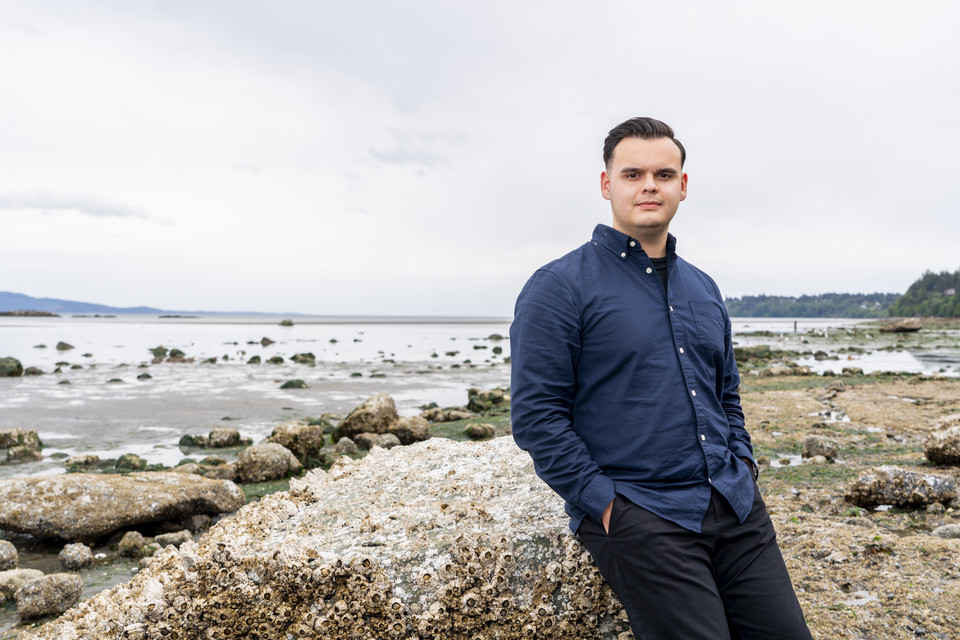
Andrew Ambers is studying for a Juris Doctor (JD) and Juris Indigenarum Doctor (JID) at UVic’s Faculty of Law. Credit: UVic Photo Services
Paddling with the land just in view, he realized that Indigenous rights to the ocean can be understood as arising from waters and extending onto lands.
“In international law, state sovereignty runs from territorial lands into territorial waters. If a state has land-based sovereignty, then its sovereignty also resides in adjacent ocean spaces,” he says, explaining that coastal nations would be impacted by having their rights diminished due to this practice. “Taking an oceanic approach to Indigenous rights in Canada ruptures many of the ways and assumptions that Aboriginal title has developed, including the tests that govern where it can be asserted and what sufficient occupation prior to Crown sovereignty means for coastal nations.”
Ambers also sees the ocean as more than just the frame of reference for aquatic or land title—recognizing the ocean as a source of law. This became the inspiration behind an article co-authored with nuučaańuł professor Rachel yacaaʔał George, entitled “Fluid Internationalisms: The Ocean as a Source and Forum of Indigenous International Law.”
Maintaining relationships with the ocean results in legal principles emerging ... If we take this seriously as a legal practice, oceans are not only a space where we can learn and teach, but also observe and draw analogies from its movements to reason through these principles and then apply them interpersonally, inter-nationally, and on waters and lands when disputes arise.
—Andrew Ambers
New take on international relations
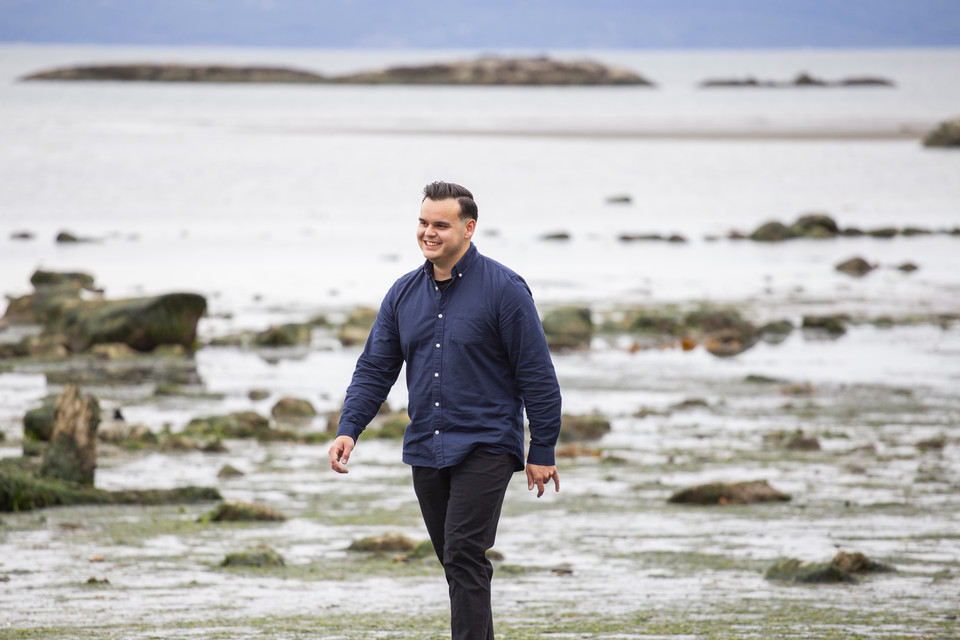
"We must collectively learn and act upon coastal Indigenous nations’ visions of water governance for a just and sustainable future." Credit: UVic Photo Services
Ambers is studying for a Juris Doctor (JD) and Juris Indigenarum Doctor (JID) at UVic’s Faculty of Law. The program is helping him to expand the research he is involved in across various Indigenous-led projects as well as what he completed during his Bachelor of Arts (Hons) in Political Science and Indigenous Studies. Investigating the rights of rivers and oceans garnered receiving the Jamie Cassels Undergraduate Research Award and 2023 Best Honours Essay Prize from the British Columbia Political Studies Association.
“Most of my current substantive work is focused on developing approaches for coastal nations to assert aquatic Aboriginal title rights, in addition to advancing the provincial and federal understanding that denying Aboriginal title in marine and intertidal zones is not only contrary to Indigenous legal orders and Canada's commitment a full box of rights, but also contrary to Canadian law and the Supreme Court of Canada’s treatment of Aboriginal title.”
This importantly includes honouring the knowledge of Elders and youth, from recalling histories and uplifting their interests, to working toward their ideal futures.
“I have been doing a lot of thinking about relationships among various Indigenous nations, but also Indigenous relationships with the Crown, and how these should be conceived of as inherently international. This results in understanding that engagements between Indigenous nations and Canadian governments are not only subject to Canadian law, but Indigenous legal processes and practices where Indigenous international law governs conduct,” he says.
This has led Ambers to explore how Indigenous Peoples have always been international actors in a vibrant international world, not only across Indigenous nations but also between nations and states.
Looking to the past for the future of law
With Indigenous Studies professor Jeff Ganohalidoh Corntassel (Cherokee), Ambers is forwarding an argument that Canadian courts must engage with Indigenous international law—Indigenous nations’ own laws that govern relations with external political communities on matters ranging from territorial boundaries to rights and responsibilities. Learning with and from international Indigenous communities, Ambers is affirming the scope of Indigenous international relations that have been practiced for centuries.
As he shares his work locally and abroad, he is reminded of the international advocacy that precedes him. Whether it is resuming the international learning that his grandfather Basil Ambers undertook decades prior in Norway with respect to aquaculture or learning with his great-aunt Gerry Ambers on Indigenous internationalism and global solidarity movements, the local and international continually inform his thinking. “Indigenous history, law, and interconnection are deeply international, and reinscribing this reality is an important practice that honours Indigenous knowledge and sovereignty,” he says. “Maintaining these relationships leads to a space where nations can focus less on strategizing litigation to focusing more on strengthening the vibrancy of relations within and across nations to govern under the sovereign authority that has never been extinguished.”
Ambers envisions that the future of water governance will be transformed in Canada by honouring coastal Indigenous legal orders. “The work of transforming water law and governance is not only in service of Indigenous nations, but also Canadians and future generations. We must collectively learn and act upon coastal Indigenous nations’ visions of water governance for a just and sustainable future.”
Photos
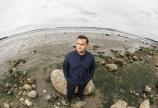


In this story
Keywords: indigenous, environment, oceans, law, reconciliation, colonialism, political science, politics, international
People: Andrew Ambers, Jeff Corntassel, Rachel George

